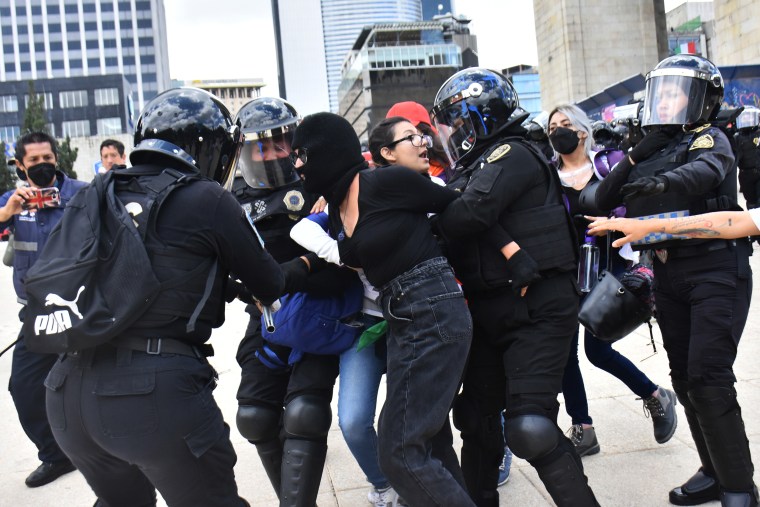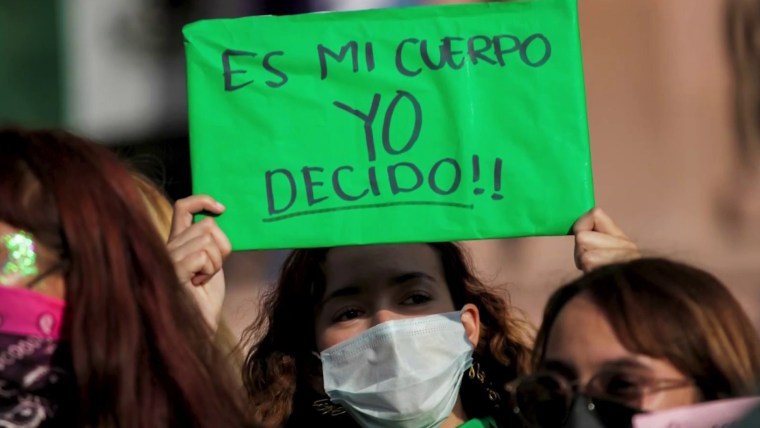Even though Mexico's Supreme Court decriminalized abortion last year, hundreds of women remain in prison under outdated anti-abortion state laws, advocates said.

Demonstrators clash with police during an abortion-rights protest in Mexico City, marking International Safe Abortion Day on Sept. 28, 2022.
Carlos Tischler / Eyepix Group/Future Publishing via Getty
Dec. 28, 2022, 10:22 AM MST / Source: Associated Press
By Associated Press
MEXICO CITY — About 200 women are still in prison in Mexico under outdated anti-abortion state laws even though the Supreme Court decriminalized abortion last year, advocates said.
Some of these women suffered miscarriages and never had an abortion procedure, advocates said. Yet they are still being punished under many state laws that consider abortion to be a form of homicide.
The laws even applied to women who haven’t had an abortion, but who suffered miscarriages.
The slow legal process to free women who are still imprisoned made some progress this month when Aurelia García Cruceño, a 23-year-old Indigenous woman who was just released from prison after three years for having a miscarriage. But many more women remain in jail for seeking abortions, which is no longer a criminal offense.
García Cruceño grew up in a Nahua indigenous community in one of the poorest mountain regions of Guerrero state. In 2019, a local village official raped her and she became pregnant. She went to live with relatives in the Guerrero city of Iguala, where she was taken to a hospital for bleeding.
She was given a blood transfusion and miscarried, and then was shocked to find herself handcuffed to the hospital bed. A police officer told her she was charged with a form of homicide.
Even though Nahuatl is her native language, she was forced to sign legal documents in Spanish.
“I was very sad, with a lot anxiety,” García Cruceño said. In prison, she practiced Spanish with fellow inmates, who she said encouraged her.
“One woman gave me some advice I’ll never forget,” she said. “’In here, you have to be strong, you have to be brave,” the woman told her.
Dec. 28, 2022, 10:22 AM MST / Source: Associated Press
By Associated Press
MEXICO CITY — About 200 women are still in prison in Mexico under outdated anti-abortion state laws even though the Supreme Court decriminalized abortion last year, advocates said.
Some of these women suffered miscarriages and never had an abortion procedure, advocates said. Yet they are still being punished under many state laws that consider abortion to be a form of homicide.
The laws even applied to women who haven’t had an abortion, but who suffered miscarriages.
The slow legal process to free women who are still imprisoned made some progress this month when Aurelia García Cruceño, a 23-year-old Indigenous woman who was just released from prison after three years for having a miscarriage. But many more women remain in jail for seeking abortions, which is no longer a criminal offense.
García Cruceño grew up in a Nahua indigenous community in one of the poorest mountain regions of Guerrero state. In 2019, a local village official raped her and she became pregnant. She went to live with relatives in the Guerrero city of Iguala, where she was taken to a hospital for bleeding.
She was given a blood transfusion and miscarried, and then was shocked to find herself handcuffed to the hospital bed. A police officer told her she was charged with a form of homicide.
Even though Nahuatl is her native language, she was forced to sign legal documents in Spanish.
“I was very sad, with a lot anxiety,” García Cruceño said. In prison, she practiced Spanish with fellow inmates, who she said encouraged her.
“One woman gave me some advice I’ll never forget,” she said. “’In here, you have to be strong, you have to be brave,” the woman told her.
SEPT. 23, 2021 04:08
Marina Reyna Aguilar, president of the Guerrero Association Against Violence Against Women, said García Cruceño’s case was illustrative of what often happens to young and poor Indigenous women.
“There are a lot of cases like Aurelia’s,” said Reyna Aguilar. In Guerrero in 2022, there were 108 women murdered and 12 cases of femicide — cases of women and girls killed because of their gender.
Guerrero is one of Mexico’s 26 states where changes have still not been made to state legal codes following the Supreme Court ruling in September. Abortion was first legalized in the capital of Mexico City in 2007.
Ten of Mexico’s 32 states have decriminalized abortion — most of them in just the past three years. Even in some of those 10 states, for example Oaxaca, abortion-rights activists say they face persistent challenges in trying to make abortion safe, accessible and government-funded.
Even as the decriminalization drive progresses, abortion-rights activists said that government authorities are doing too little to raise awareness about abortion access and help low-income women afford the procedure. Only a few days ago, the Ministry of Health published guidelines for abortions in public clinics.
“There is a need to strengthen those institutions that have the legal mandate to defend the rights of women,” Reyna Aguilar said.
A coalition of human rights groups has now filed constitutional injunctions in five of Mexico’s 32 states, seeking to get authorities to identify and act on similar state violations of the national ruling.
In García Cruceño’s case, it wasn’t until Dec. 20, after she had spent three years in prison, that the subject came up in President Andrés Manuel López Obrador’s daily press briefing. The president promised to look into the case.
That night, a judge ruled that there was insufficient evidence to continue holding García Cruceño. She was freed.
Now, she says it surprises her to wake up at home, not in a prison cell.
“It feels strange,” García Cruceño said. “I still cannot believe it when I wake up and see my mother.”
García Cruceño has decided to resume her high school studies; she hopes to become a teacher one day. And she hopes her case will help others in confinement.
“I don’t want anyone to go through what I did,” she said. “Nobody should remain silent. They have to speak out about what happened to them.”
Associate
Marina Reyna Aguilar, president of the Guerrero Association Against Violence Against Women, said García Cruceño’s case was illustrative of what often happens to young and poor Indigenous women.
“There are a lot of cases like Aurelia’s,” said Reyna Aguilar. In Guerrero in 2022, there were 108 women murdered and 12 cases of femicide — cases of women and girls killed because of their gender.
Guerrero is one of Mexico’s 26 states where changes have still not been made to state legal codes following the Supreme Court ruling in September. Abortion was first legalized in the capital of Mexico City in 2007.
Ten of Mexico’s 32 states have decriminalized abortion — most of them in just the past three years. Even in some of those 10 states, for example Oaxaca, abortion-rights activists say they face persistent challenges in trying to make abortion safe, accessible and government-funded.
Even as the decriminalization drive progresses, abortion-rights activists said that government authorities are doing too little to raise awareness about abortion access and help low-income women afford the procedure. Only a few days ago, the Ministry of Health published guidelines for abortions in public clinics.
“There is a need to strengthen those institutions that have the legal mandate to defend the rights of women,” Reyna Aguilar said.
A coalition of human rights groups has now filed constitutional injunctions in five of Mexico’s 32 states, seeking to get authorities to identify and act on similar state violations of the national ruling.
In García Cruceño’s case, it wasn’t until Dec. 20, after she had spent three years in prison, that the subject came up in President Andrés Manuel López Obrador’s daily press briefing. The president promised to look into the case.
That night, a judge ruled that there was insufficient evidence to continue holding García Cruceño. She was freed.
Now, she says it surprises her to wake up at home, not in a prison cell.
“It feels strange,” García Cruceño said. “I still cannot believe it when I wake up and see my mother.”
García Cruceño has decided to resume her high school studies; she hopes to become a teacher one day. And she hopes her case will help others in confinement.
“I don’t want anyone to go through what I did,” she said. “Nobody should remain silent. They have to speak out about what happened to them.”
Associate

No comments:
Post a Comment